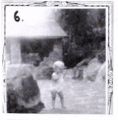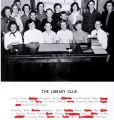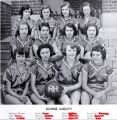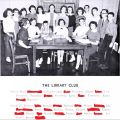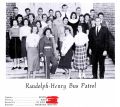User:NightcoreSwift004
Chris' ancestors sandbox test for a page
Robert Franklin Chandler Sr
Robert Franklin Chandler Sr. (8 February, 1906 - 27 December, 1977) was a textile mill worker and a security guard who was Bob's father and Chris's paternal grandfather.
Born and raised in a rural area of Chilton County, Alabama, he was the son of a farmer and a day laborer Joseph Jessie Chandler and Martha Headley. He was one of the youngest child of 14 children in the Baptist family, 5 of whom died infancy. While growing up, Most of his siblings lived with relatives instead of his parents, including Robert himself who lived with his aunt and uncle Sadie and James Littleton. After dropping out of high school in his freshman year, he worked at a steel mill before moving to the Dallas-Fort Worth area at age 18, where he found work as an insurance agent. In June 1926, Robert, a Baptist, married Jean Hollomon, a Methodist—the daughter of a pharmacist—when they were both at a young age of 20, eventually having their only child, Bob, a year later.
After Bob was born, presumably at the behest of his wife and father-in-law, Robert worked as a pharmacist for a few years before they moved back to Alabama in the early 1930s, living in Sylacauga. There, he worked for almost 20 years as a supplier for textile industry Avondale Mills (excluding a few years of military works for World War 2), where his siblings was also working at. Jean would also briefly work at Avondale. Despite his steady employment, which provided an income of around $32,000 annually, the family faced financial struggles, as later recounted by Bob in a letter detailing their issues with poverty. Robert's wife, Jean, would unexpectedly pass away at a young age of 39 in May 1945, shortly before Bob finished high school. Robert Sr would later get remarried in April 1949 to Dorothy Julia Wolfe—the daughter of a lumber grader—who has a daughter from a previous marriage and he would later adopt her.
In 1955, Robert and his family moved to Winston-Salem, North Carolina & settled at the 6-room apartment in the neighborhood of Piedmont Park right next to Smith Reynolds Airport, where they stayed for the next 13 years. Robert soon found employment as a merchant patrolman (or security guard) for a Western Electric's plant building, the same company his son Bob was working at as an electrical engineer. Living in a housing project, his new employment remained his family's financial status as a struggling working class.
In October 1966, however, Robert Sr received an eviction notice before being told by his landlord in February 1967, that he has been evicted from his Piedmont Park apartment home with no reason given. As a result, Robert took legal action against Winston-Salem Housing Authority over Forsyth Superior Court to keep his family home. The housing authority claimed he didn't pay back rents, while Robert Sr. claimed he did pay rents all the time despite struggling financially. The Chandlers were allowed to remain in their Piedmont Park apartment while the case were on appeal, but they would later lose the case in January 1968. Chandler and housing authority agreed the judge's agreement orders, ordering Chandler to pay $345 in back rents immediately, $450 in $10 weekly installment and that he had until April 1968 to move out. After the agreements, however, Robert Sr. made statements to a reporter that he wouldn't pay a "penny one" of the back rents, understandably stressing that he had "no property, no money in the bank" and that they can collect nothing from him but "judgement".
Subsequently, Chandler and his family moved out of the Piedmont Park in April 1968, relocating to a 6-room house in the neighborhood of Forest Park, nearby Bowman Gray Stadium & Winston-Salem State University. Robert would later retire in 1970 at age 64, after 15 years in the security service and later passed away in December 1977 at age 71 after 3 months of late stage pancreatic cancer. He was Chris' last grandparent to die.
From 1950 to 1962, Robert and his wife Dorothy had seven children, including Wayne Chandler in January 1955 and twin daughters Betty & Joan Chandler in April 1962. From various newspapers, Robert was regarded as a great loving husband and father, who had a hard time fighting tooth and nail for his family to survive. One of the examples is in 1966, believing his 16-year old son Ray would have been electrocuted at his job, rushed to his work place to save him and called fire department and rescue team after he failed to find him in the building.
Joseph Otto Weston
Joseph Otto "Joe" Weston (3 October, 1896 - 8 April, 1955) was a lifelong tobacco farmer who was Barb's father and Chris's maternal grandfather.
Born and raised in rural area of Red Oak, Virginia, he was the 4th child out of 5th and the youngest son of a farmer Joseph Edward Weston Jr. and Sarah Ann Hamilton. Up until he was around 5 years old, he was unbreeched, meaning he wore girly clothes at a very young age. Dropping out of school at 5th grade, Joe started working on the farm at an early age his whole life. His father Joseph Jr. and grandfather Joseph "John" Weston Sr., were both tobacco farmers and Joe himself would later become a self-employed tobacco farmer and also a carpenter.
He continued working on the farm while living with his parents (excluding a brief military works for World War 1) until he was 30 years old, when he married a 15 years old daughter of tobacco farmer Carrie Edna Wynn of South Hill. They were married in Carrie's mother's hometown Warrenton, North Carolina in February 1927. From 1927 to 1950, they had 8 children together, including Corrina (1934), Barbara (1941), Harriet (1947) and Wayne (1950) and raised them in a low-income farming household in northwest Red Oak. In his later life during World War 2 (1942), Joe was assigned to work as a carpenter for around a year to build a military base Fort Pickett (now Fort Barfoot) in Blackstone, Virginia, 50 miles northeast of Red Oak.
Joe would soon get into a couple incidences that would soon get to his death. When Barb was two years old, she witnessed his father falling off the roof, almost killing himself while painting his house. About 12 years later Joe would instantly pass away due to broken neck after falling off under a rear wheel of his horse drawn wagon while at work hauling woods. His body was discovered when a driverless horse & wagon arrived at a nearby service station. Barbara was 13 when he was killed and the younger children, Madeline, Harriet and Wayne were 11, 8 and 5 years old respectively. Funeral service were later held at Antioch Baptist Church in Red Oak and was buried in the church's cemetery, where he was a longtime member with his wife and children, along his parents and siblings. Two years later in October 1957, Carrie would marry a longtime bachelor Elmer Thomas Rickman, who were both about 46 and were both born in the same month. Elmer would become a 16 year old Barbara's stepfather and Carrie's younger children.
After his death, his property, a 9.1 acres of land which contained a house, a barn and a farm with 971 pounds of tobacco, was inherited by his two children, Barbara and William Stanley Weston (1932 - 1984). Barbara and Stanley fought against each other to fully have their dad's property, with Stanley bringing a whole lawsuit about it from March 1974 to March 1975, with no knowledge of who had won the lawsuit. It's unknown why two of his children wanted to fully have his whole property, but knowing Barb, Stanley might have done so in order to prevent Barb from selling their dad's property for money.
Robert Wynn
Robert Pettus Wynn (17 Nov 1882 - 20 Jan 1954) was a tobacco farmer and a moonshiner who was Barb's maternal grandfather and Chris's matrilineal great-grandfather.
Born in South Hill area, Robert was the middle of three children and the oldest son of illiterate farmer, Francis Wynn, and Harriet Jones. Dropping out at 3rd grade, he started working in manual labor on his parents' farm at a very young age before later becoming a self-employed tobacco farmer. In December 1903, he married Victoria Malone Thompson of Warrenton, North Carolina, when they were 21 and 17 respectively. From 1904 to 1924, they had 7 children together, 5 girls and 2 boys, including Carrie Edna Wynn in December 1911, and have raised them on a farming household in the area between Baskerville, Boydton and mainly South Hill. Two of his children died at a relatively young age; his oldest son Bernard Wynn died in 1939 at age 31 from a car accident and his daughter Carrie died in 1968 at age 56 from a stroke.
Robert Wynn was described by his family members as a scoundrel who drank heavily and had a girlfriend during his marriage. His family members said he "failed to provide even the most basic support for his wife and children" and that he was a moonshiner. Victoria passed away in October 1935 after one year of uterus cancer, and about two years later in March 1937, Robert married to a single mother of two, Virginia Harris, the same girlfriend he cheated on Victoria with. His marriage with Virginia Harris lasted until his death in 1954.
Robert's health would later start to decline as he grew older. Weighting under 113 pounds at 5'6", underweight Robert was diagnosed with hypertensive heart disease at age 61. 10 years later in January 1954, he started suffering from a hemorrhagic stroke (i.e. blood begins bleeding into the brain) before subsequently passing away 48 hours later at age 71 as a result of the hemorrhagic stroke's complications. He was later buried at his first wife's family cemetery "Thompson Family Cemetery" in South Hill.
John James Hollomon
John James Hollomon (3 May 1868 - 16 Mar 1950) (sometimes known as J.J. Hollomon) was a pharmacist who was Bob's maternal grandfather and Chris' patrilineal grandfather.
Born in Meigs County, Tennessee, he was the second youngest child out of 9 children to Meigs attorney and a lawyer, Esquire John Richmond Hollomon, and Mary Baker. Owing to his father's successful legal and political career, he was raised on a comfortably middle-class household at a hundreds of acres that contained a large farm. John worked on his parents' farm alongside his siblings while attending school, with his father's help, a "gentlemen farmer".
After finishing high school in 1886, John left Tennessee & moved to Wylie, Texas in 1890, a newly incorporated city in northeast Dallas with 400 residents. He worked during the 1890s for the postal service as a assistant postmaster before switching his career at the beginning of the 1900s. John was considered as one of the Wylie's oldest and earliest businessmen at the time. He was the vice president of the Wylie's first state bank in 1910s and donated moneys to local schools.
John was a well known pharmacist in the Wylie's Collin County for almost 50 years, and owning his own pharmacy store, Hollomon Drug Store, in the early 1900s. During his career, besides selling medicines, he gave away all kinds of materials, supplies, gifts and all other things from his pharmacy store, that included school supplies, candies, cosmetics, baby gifts, pottery, etc. Giving away gifts and others from his pharmacy store were generous enough that his pharmacy store was one of the 40+ businesses and stores mentioned in Wylie's newspaper article, for helping out and gifting the local high school's students. He also let a dentist open one of their dental offices for practical session in his pharmacy store.
John was married twice and had seven children, six of whom survived. In about 1899, he married Mary Francis Teer of Cumby, the daughter of a osteopathic doctor, and had four children together, including Jean Hollomon, Bob's mother. Mary died in July 1914 from complications of childbirth, the day after she gave birth to her daughter Mary Maxine Hollomon. John got married again in April 1915 to Helen Nelms of Denison, the daughter of a furniture salesman, who would work at his pharmacy store as a sales clerk. They had three children together, two of whom survived, including Dr. John James "J.J." Hollomon Jr, Bob's half-uncle.
John was described as a highly respected person, a very generous and sweet man by family members and many friends of his. Bob reminisces that his grandfather had given him a straight razor "by means of [John's] last will and testament," and Bob instead broke it while using it as a screwdriver. Bob held into this regret well into his 60s, because he believed John wanted him to have it as a personal item and value. At the time of Bob writing his 1987 letters to Chris, Bob thinks of his mother, who passed away when he was 17, and maternal grandfather highly in a personal manner, to the point that he was a devout Methodist, like his mother and grandfather.
John had some serious health problems in his last years of his life. In December 1947, at age 79, John was diagnosed with diabetes. His diabetes was apparently so severe that in September 1948, he was rushed in an ambulance ride to the Dallas hospital and were in and out of relapses during his 3 months hospital stay. In November, John had two major operations, amputating both of his legs in a span of week, and that his condition was reportedly getting improved. As a result of the surgeries, he retired as a pharmacist after almost 50 years, and transferred his pharmacy store ownership to his wife Helen, who continued working & managing his pharmacy store after his death. Despite the amputation and retiring, he continued working part time with his wife at the pharmacy store.
It seems his conditions didn't get any better after the surgery; he suffered a "bad attack" in October 1949, 5 months before his death, and was told that his health was improving again. In March 1950, he passed away 2 months away from his 82nd birthday at his home in Wylie, Texas after over two years of diabetes complications. His funeral service were held at a Methodist church in Wylie and was buried in a city's cemetery.
Joseph Jesse Chandler
Caleb Headley
William Teer
Dr. William Teer (March 29, 1837 - October 19, 1919) was an osteopath and a Confederate army soldier who was Bob's matrilineal great-grandfather and Chris's great-great grandfather.
Born in Neshoba County, Mississippi, he was the third child out of eight siblings to a poor farmer, Curtis Wiley Teer, and Dollie Jordan. He grew up in Neshoba County and later to Angelina County, Texas when he was 10 years old. The family relocated again to Hopkins County outside of Cumby in 1860, where he worked on his parents' farm before enlisting for the Civil War.
In October 1861, aged 24, William and his two brothers James (1830 - 1863) and Wiley (1839 - 1862), enlisted in the Confederate Army in San Antonio. Serving in the Company K, 4th Texas Cavalry Regiment, William and Wiley participated in the New Mexico campaign under General Sibley. Both of his brothers died during the war; James died at a Union prison camp in Williamsburg, Virginia, in 1863. William and Wiley fought in the battles of Valverde and later to Glorietta Pass, where in March 1862, when assisting in capturing artillery battery, Wiley was reportedly "lost or killed" and William was shot and seriously wounded. His right arm was shattered by a minie ball, sustained a damaged spleen and later contracted hepatitis at a hospital. After the capture of Texas Army's supply wagons by US Army, they retreated, abandoning William and other recovering soldiers at the Santa Fe hospital before subsequently being captured in April. He was later paroled a month later in May 1862, walking a 1,500-mile journey from Santa Fe, New Mexico to his home in Texas before returning to military service. Due to his injuries and disability, he was honorably discharged from his unit by General Thomas Green in September 1863 and returned to his home in Cumby, working as a farmer despite his shattered right arm.
William was married four times throughout his life. In December 1862, he married his colleague's sister Mary Frances Carraway of Alabama, who passed away in 1867. He then remarried Louisa Frances Spears of Tennesse in July 1868, but that marriage also ended early. In January 1871, he married Nancy Jane Coburn of Ashley County, Arkansas, presumably an orphaned girl. From this marriage, he had seven children, including Mary Francis Teer, Bob's maternal grandmother and the wife of John James Hollomon. After Nancy's death in 1894, William remarried Bettie King of Mount Pleasant in March 1907 at age 70, and this marriage lasted until his death in 1919.
In November 1903, inspired by the nerve damage in his shattered right arm, William established himself as an osteopathic doctor in Tyler, Texas, specializing in "Exophthalmic Goitre, Biliary Calculi (Gall Stones) Paralysis, and all Nervous Diseases." He became the president of the State Association of Drugless Doctors of Texas and advocated massaging and other holistic approaches to wellness. As a doctor in Tyler, he was described as a highly respected figure, endorsed by many prominent members of the city's society. William retired in 1916 after suffering a paralyzing stroke and resided at Texas Confederate Home in Austin before moving back to Cumby in June 1918, a beloved city where he was considered a longtime prominent citizen. He later passed away in October 1919 at his youngest daughter's home Miller Grove after suffering a second paralyzing stroke.
William was mentioned in a biographies book about some of the men that served the Confederate States from Texas titled "Texans who Wore the Gray (1907)", written by a Confederate officer, journalist, and author Sidney Smith Johnson (1840-1910). Johnson described William as "a brave Confederate soldier, a man of fine education, and a Christian gentleman."
Joseph Chandler (rewriting)
Rev Sidney Chandler (rewriting=
Francis Weston (rewriting)
John Chandler (rewriting)
Sandbox page test
| barb high school photos |
|---|

